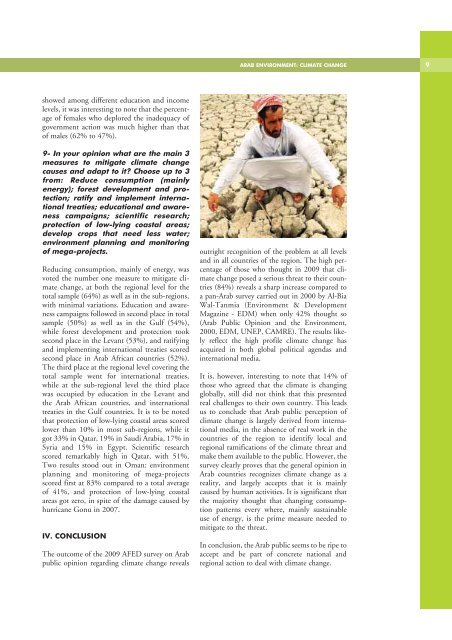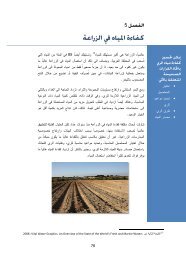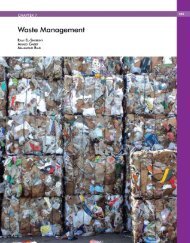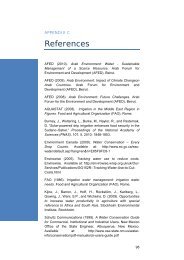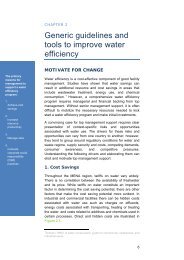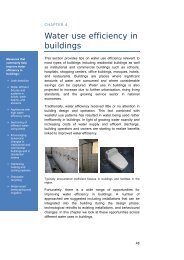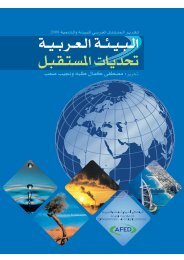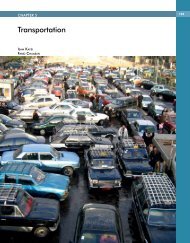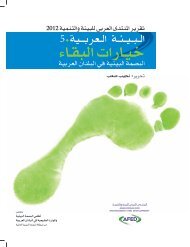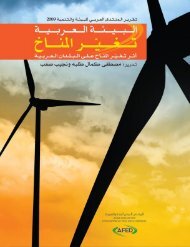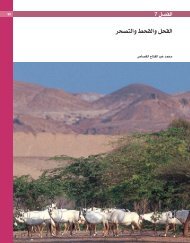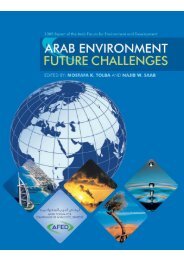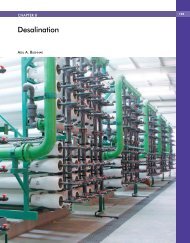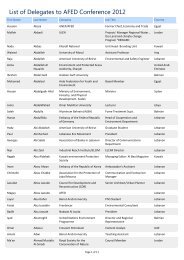Impact of Climate Change on Arab Countries - (IPCC) - Working ...
Impact of Climate Change on Arab Countries - (IPCC) - Working ...
Impact of Climate Change on Arab Countries - (IPCC) - Working ...
Create successful ePaper yourself
Turn your PDF publications into a flip-book with our unique Google optimized e-Paper software.
ARAB ENVIRONMENT: CLIMATE CHANGE<br />
9<br />
showed am<strong>on</strong>g different educati<strong>on</strong> and income<br />
levels, it was interesting to note that the percentage<br />
<str<strong>on</strong>g>of</str<strong>on</strong>g> females who deplored the inadequacy <str<strong>on</strong>g>of</str<strong>on</strong>g><br />
government acti<strong>on</strong> was much higher than that<br />
<str<strong>on</strong>g>of</str<strong>on</strong>g> males (62% to 47%).<br />
9- In your opini<strong>on</strong> what are the main 3<br />
measures to mitigate climate change<br />
causes and adapt to it Choose up to 3<br />
from: Reduce c<strong>on</strong>sumpti<strong>on</strong> (mainly<br />
energy); forest development and protecti<strong>on</strong>;<br />
ratify and implement internati<strong>on</strong>al<br />
treaties; educati<strong>on</strong>al and awareness<br />
campaigns; scientific research;<br />
protecti<strong>on</strong> <str<strong>on</strong>g>of</str<strong>on</strong>g> low-lying coastal areas;<br />
develop crops that need less water;<br />
envir<strong>on</strong>ment planning and m<strong>on</strong>itoring<br />
<str<strong>on</strong>g>of</str<strong>on</strong>g> mega-projects.<br />
Reducing c<strong>on</strong>sumpti<strong>on</strong>, mainly <str<strong>on</strong>g>of</str<strong>on</strong>g> energy, was<br />
voted the number <strong>on</strong>e measure to mitigate climate<br />
change, at both the regi<strong>on</strong>al level for the<br />
total sample (64%) as well as in the sub-regi<strong>on</strong>s,<br />
with minimal variati<strong>on</strong>s. Educati<strong>on</strong> and awareness<br />
campaigns followed in sec<strong>on</strong>d place in total<br />
sample (50%) as well as in the Gulf (54%),<br />
while forest development and protecti<strong>on</strong> took<br />
sec<strong>on</strong>d place in the Levant (53%), and ratifying<br />
and implementing internati<strong>on</strong>al treaties scored<br />
sec<strong>on</strong>d place in <strong>Arab</strong> African countries (52%).<br />
The third place at the regi<strong>on</strong>al level covering the<br />
total sample went for internati<strong>on</strong>al treaties,<br />
while at the sub-regi<strong>on</strong>al level the third place<br />
was occupied by educati<strong>on</strong> in the Levant and<br />
the <strong>Arab</strong> African countries, and internati<strong>on</strong>al<br />
treaties in the Gulf countries. It is to be noted<br />
that protecti<strong>on</strong> <str<strong>on</strong>g>of</str<strong>on</strong>g> low-lying coastal areas scored<br />
lower than 10% in most sub-regi<strong>on</strong>s, while it<br />
got 33% in Qatar, 19% in Saudi <strong>Arab</strong>ia, 17% in<br />
Syria and 15% in Egypt. Scientific research<br />
scored remarkably high in Qatar, with 51%.<br />
Two results stood out in Oman: envir<strong>on</strong>ment<br />
planning and m<strong>on</strong>itoring <str<strong>on</strong>g>of</str<strong>on</strong>g> mega-projects<br />
scored first at 83% compared to a total average<br />
<str<strong>on</strong>g>of</str<strong>on</strong>g> 41%, and protecti<strong>on</strong> <str<strong>on</strong>g>of</str<strong>on</strong>g> low-lying coastal<br />
areas got zero, in spite <str<strong>on</strong>g>of</str<strong>on</strong>g> the damage caused by<br />
hurricane G<strong>on</strong>u in 2007.<br />
IV. CONCLUSION<br />
The outcome <str<strong>on</strong>g>of</str<strong>on</strong>g> the 2009 AFED survey <strong>on</strong> <strong>Arab</strong><br />
public opini<strong>on</strong> regarding climate change reveals<br />
outright recogniti<strong>on</strong> <str<strong>on</strong>g>of</str<strong>on</strong>g> the problem at all levels<br />
and in all countries <str<strong>on</strong>g>of</str<strong>on</strong>g> the regi<strong>on</strong>. The high percentage<br />
<str<strong>on</strong>g>of</str<strong>on</strong>g> those who thought in 2009 that climate<br />
change posed a serious threat to their countries<br />
(84%) reveals a sharp increase compared to<br />
a pan-<strong>Arab</strong> survey carried out in 2000 by Al-Bia<br />
Wal-Tanmia (Envir<strong>on</strong>ment & Development<br />
Magazine - EDM) when <strong>on</strong>ly 42% thought so<br />
(<strong>Arab</strong> Public Opini<strong>on</strong> and the Envir<strong>on</strong>ment,<br />
2000, EDM, UNEP, CAMRE). The results likely<br />
reflect the high pr<str<strong>on</strong>g>of</str<strong>on</strong>g>ile climate change has<br />
acquired in both global political agendas and<br />
internati<strong>on</strong>al media.<br />
It is, however, interesting to note that 14% <str<strong>on</strong>g>of</str<strong>on</strong>g><br />
those who agreed that the climate is changing<br />
globally, still did not think that this presented<br />
real challenges to their own country. This leads<br />
us to c<strong>on</strong>clude that <strong>Arab</strong> public percepti<strong>on</strong> <str<strong>on</strong>g>of</str<strong>on</strong>g><br />
climate change is largely derived from internati<strong>on</strong>al<br />
media, in the absence <str<strong>on</strong>g>of</str<strong>on</strong>g> real work in the<br />
countries <str<strong>on</strong>g>of</str<strong>on</strong>g> the regi<strong>on</strong> to identify local and<br />
regi<strong>on</strong>al ramificati<strong>on</strong>s <str<strong>on</strong>g>of</str<strong>on</strong>g> the climate threat and<br />
make them available to the public. However, the<br />
survey clearly proves that the general opini<strong>on</strong> in<br />
<strong>Arab</strong> countries recognizes climate change as a<br />
reality, and largely accepts that it is mainly<br />
caused by human activities. It is significant that<br />
the majority thought that changing c<strong>on</strong>sumpti<strong>on</strong><br />
patterns every where, mainly sustainable<br />
use <str<strong>on</strong>g>of</str<strong>on</strong>g> energy, is the prime measure needed to<br />
mitigate to the threat.<br />
In c<strong>on</strong>clusi<strong>on</strong>, the <strong>Arab</strong> public seems to be ripe to<br />
accept and be part <str<strong>on</strong>g>of</str<strong>on</strong>g> c<strong>on</strong>crete nati<strong>on</strong>al and<br />
regi<strong>on</strong>al acti<strong>on</strong> to deal with climate change.


